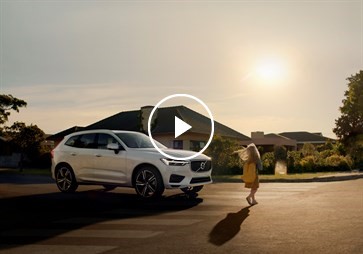“Sometimes the moments that never happen matter the most.” This is the beguiling thought that lies behind Volvo Cars’ new XC60 film. But what does it mean?
Taking a typically human approach, Volvo has captured the essence of how advanced safety technology has the power to change the lives of people both in and around the car.
The film follows a young girl’s journey to her first day at a new school and shows a glimpse of what life holds for her in the coming years – growing up, travelling the world, settling down and raising a family. All of this comes to an abrupt stop as the girl steps out in front of an oncoming Volvo car. The Volvo’s safety system detects the girl and applies its autonomous emergency brake, preventing what could have been a life-changing collision. The film ends with a conclusion: “Sometimes the moments that never happen matter the most.”
Over 1.2 million people die in traffic accidents around the globe each year, but Volvo believes its vision of an injury and fatality-free future can soon be a reality.
Volvo Cars presented several new safety features with the launch of the new XC60. A steer support functionality has been added to Volvo’s City Safety autonomous emergency braking system, while a new system, Oncoming Lane Mitigation, uses steer assist to help mitigate head-on collisions. Volvo’s Blind Spot Information System (BLIS) has also been updated with a steer assist function to reduce the risk of lane-changing collisions.
The new XC60 replaces Volvo’s highly successful original XC60, which was the bestselling premium mid-sized SUV in Europe with more than a million units sold globally since its debut in 2008.
“This film featuring the new XC60 highlights how important active safety systems have become and reflects Volvo’s leadership in this area. We launched our City Safety autonomous emergency braking system as standard equipment in all new Volvos back in 2008, starting with the first generation XC60. Today, these systems are finally becoming an industry standard,” said Anders Gustafsson, Senior Vice President, Region EMEA at Volvo Car Group.
Ninety-four per cent of all accidents are caused by human factors. By using advanced safety technology Volvo believes it can help to reduce the human factor in traffic accidents.
“Safety is at the heart of everything we do at Volvo Cars. It always has been and it always will be. With this film we hope to remind people why we continue to focus on car safety, and how important it is for us all,” said Björn Annwall Senior Vice President Global Consumer Experience at Volvo Car Group.
In Sweden alone, Volvo has seen a decline of around 45 per cent in rear-end frontal crashes thanks to its collision warning with autobrake system.
“We have been working with collision avoidance systems for many years and we can see how effective they are. With the XC60 we are determined to take the next step in reducing avoidable collisions with the addition of steering support and assistance systems. At Volvo we take that extra step – we protect people inside and outside the car whenever possible,” said Malin Ekholm, Vice President, Volvo Cars Safety Centre.
——————————-
Volvo Car Group in 2016
For the 2016 financial year, Volvo Car Group recorded an operating profit of 11,014 MSEK (6,620 MSEK in 2015). Revenue over the period amounted to 180,672 MSEK (164,043 MSEK). For the full year 2016, global sales reached a record 534,332 cars, an increase of 6.2 per cent versus 2015. The record sales and operating profit cleared the way for Volvo Car Group to continue investing in its global transformation plan.
About Volvo Car Group
Volvo has been in operation since 1927. Today, Volvo Cars is one of the most well-known and respected car brands in the world with sales of 534,332 cars in 2016 in about 100 countries. Volvo Cars has been under the ownership of the Zhejiang Geely Holding (Geely Holding) of China since 2010. It formed part of the Swedish Volvo Group until 1999, when the company was bought by Ford Motor Company of the US. In 2010, Volvo Cars was acquired by Geely Holding.
As of December 2016, Volvo Cars had over 31,000 employees worldwide. Volvo Cars head office, product development, marketing and administration functions are mainly located in Gothenburg, Sweden. Volvo Cars head office for China is located in Shanghai. The company’s main car production plants are located in Gothenburg (Sweden), Ghent (Belgium), Chengdu and Daqing (China), while engines are manufactured in Skövde (Sweden) and Zhangjiakou (China) and body components in Olofström (Sweden).

